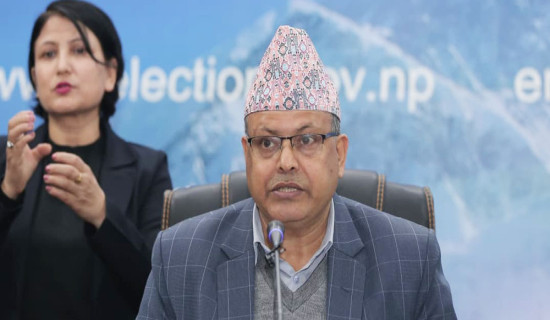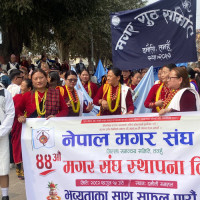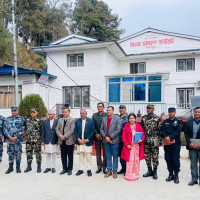- Friday, 27 February 2026
Bolster Public Institutions For Robust Republic
The republican system, established 17 years ago, has already taken deeper root. In 2008, the country's politics took a historic course: the 240-year monarchy was formally abolished by the elected Constituent Assembly (CA). Then, in 2015, it was institutionalised by promulgating the new constitution. The country witnessed two electoral cycles in 2017 and 2022 to fill the positions of three-layer governments –federal, provincial, and local. Periodic polls have brought fresh faces into the government, revitalising the federal republican system in the spirit of the new charter.
Despite all shortcomings, Nepal's republican order enjoys a massive popular mandate. As a result, it has been consolidated and has become an integral part of the lives of Nepalis. In the federal parliament, the republican forces command more than 90 per cent support, while a fraction of lawmakers stand against it. People's consent is the primary basis for governance and its legitimacy. Elections form the cornerstone of democracy, as they serve as oxygen for a functional democracy. People can remove elected officials from their posts through the ballot box if they are found unfit for public office. This is the beauty and strength of the democratic system upon which the republic's foundation has been laid.
Supremacy
One does not need to flip through the pages of thick books on political science and sociology to know the supremacy of the republican system. Nepal's monarchical system was considered a remnant of centuries-old feudalism, in which courtiers, unelected officials, and a cabal of elites exercised their power and syphoned off public funds. Those without access to power centres operating in an opaque setting will likely be deprived of the opportunity they deserve due to their academic excellence and integrity. It is only in a free, open, democratic atmosphere that individuals' aptitude and capacity are recognised and utilised.
Nepal's democratic journey began in fits and starts. It suffered disruptions repeatedly, and the monarchy played spoilsport to nip democracy in the bud. This is why Nepalis have had to wage struggles for democracy, freedom, and equality for decades. For the first time, the Nepali people experienced democracy and exercised human rights in 1951. But the democratic experiment was short-lived. Within a decade, autocracy prevailed over democracy.
After the 1990 political change, Nepalis felt it was their final battle against the autocratic monarchy. But this assumption turned out to be an illusion. In 2005, King Gyanendra seized power in a bloodless coup, curtailing the fundamental rights of the citizens. This triggered a new wave of protests in the streets. Around a million people came to the streets, calling for the end of the dictatorial monarchy and the restoration of complete democracy.
Also known as the April Uprising, Janandolan II set the stage for reinstating the dissolved House of Representatives (HoR) that suspended the king until the CA decided his fate. The CA, elected a second time, brought the new constitution that declared Nepal a federal, secular republic, marking a transformative change in Nepali society. The inherent undemocratic character of the monarchy led to its eventual demise. This transformation was beyond imagination just a few decades ago. Under the new federal setup, governance structures have been decentralised, local bodies have been granted rights to mobilise resources, and public services have expanded.
As we are observing Republic Day today, it is prudent to rationally assess the 17 years of the experiment of the republican order. Without examining the shortcomings and strengths of a system, it can't be reformed to make it viable to deliver goods and services to the citizens. This has become more relevant as pro-monarchical elements have begun to hit the streets, demanding the restoration of monarchy and a Hindu state. This is a political and moral challenge to the ruling and opposition parties, which have been in power for over two decades.
Nepal has witnessed many political upheavals. However, challenges always persist in institutionalising achievements and delivering on the lofty promises made during the revolutions and elections. Nepali political parties have proved their mettle in engineering successful political movements. Still, they often falter when it comes to realising the aspirations of the people who have not nurtured high dreams but a decent life with incomes that meet their fundamental requirements.
The functionality of the republican system largely hinges on the effectiveness of public institutions established to provide public goods to the people. Health, education, employment, social security, and a clean environment constitute the common good that all citizens are entitled to. However, the tendency to politicise and make the public offices the recruiting centres of party cadres undermines their efficiency and professional norms. So meritocracy and impartiality should be the basis of public institutions strengthening the democratic republic.
Democratisation of the parties
Democratisation of political parties and their sister organisations are equally essential to buttress the republican setup. The bottom-up approach enables the parties to heed the genuine inputs and concerns of the lower-rung party bodies, thereby articulating the inclusive vision and participatory spirit of the entire party's workers. When their views are incorporated into the policy documents, the system will be free from contradictions and inertia. Active civic engagement is also critical to deterring the authoritarian impulses of the parties and their leaders.
Abuse of power and rampant corruption are the cancers of society. So, transparency, accountability, and responsive government must be given priority to root out such anomalies. Political instability is often blamed for bad governance. However, when the political and bureaucratic leadership are sincere and accountable for their decisions and actions, many negative repercussions from instability can be minimised or significantly avoided. Therefore, our republic faces a threat not from the outside but from the inside. Financial integrity and adherence to democratic ideals and ethics are essential to make our republic functional and deliverable. May the Republic Day inspire all to commit to its values and move accordingly.
(The author is deputy executive editor of this daily.)

















